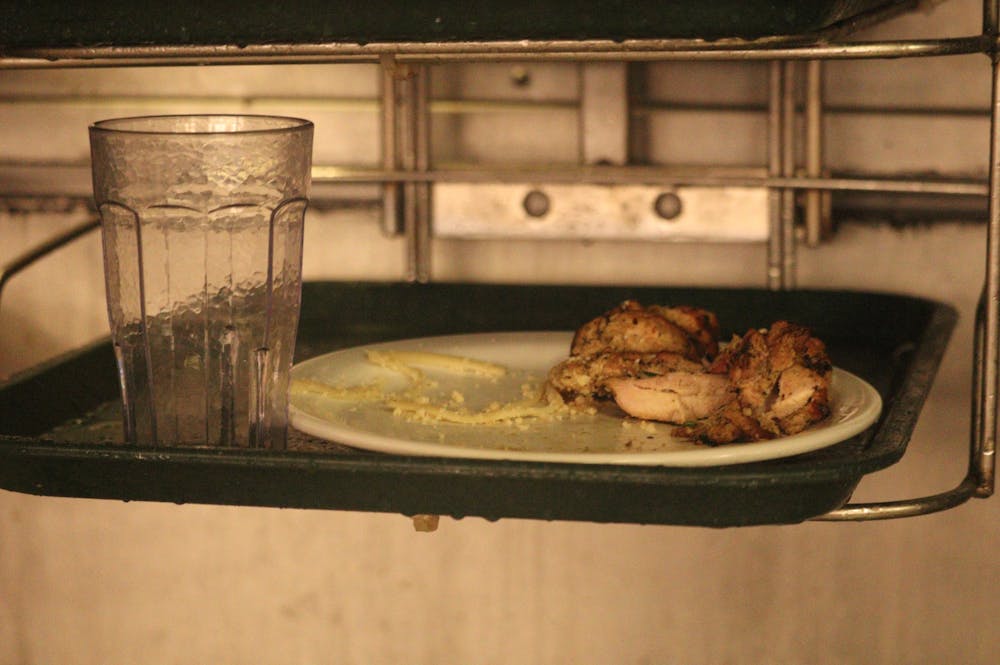When I was younger, my mum had a very simple rule for me and my brother: do not waste food.
We were to eat everything that we served ourselves and were not allowed to throw away any of the food on our plates. Admittedly, when you force children to eat, you run the risk of them developing unhealthy or even dangerous relationships with food; there are countless better ways to manage food education.
Having said that, my mum’s intention was to make me and my brother realize the value of food, something I believe is essential for all of us to acknowledge and appreciate. After looking at the dining hall carousel trays full of leftover food, we might need to ask ourselves if we really appreciate the value of food enough.
College is a pivotal point in every person’s life. For most of us, it is the first time we have agency over most of our decisions. Therefore, it is puzzling and disheartening for me to see the heaps of food left behind in the dining halls.
Throwing away food when you have agency over what and how much you serve yourself is something I believe to be quite avoidable
My curiosity led me to do some research on the issue, and what I found only alarmed me further. Approximately 40% of food produced in the United States goes uneaten, according to the Natural Resources Defense Council, with college campuses responsible for 22 million pounds of annual food waste. This would average out to each student wasting about 142 pounds of food each year.
I reached out to Brett Simons, the Ross dining manager, and learned of a study that had been conducted under the project name “Weigh the Waste” in the past. It weighed all food that was left behind by students in a single day in Ross. The data collected on that single day in April of 2022 revealed that 354.2 pounds of food were wasted.
More than 350 pounds of food, in one day, in one dining hall. Those figures demonstrated to me that our Middlebury community does not appreciate our food in the way that we should.
In response to this issue, I designed and executed a project in Proctor Dining hall called “Reduce the Waste” for my course in Community Connected Learning. It’s aimed at achieving a behavioral change in the Middlebury community regarding student attitudes towards food in campus dining halls. The amount of visible food that is left behind on plates is something that alarms others as much as it alarms me. I hope to introduce an element of introspection and reflection surrounding our relationship with food at Middlebury.
The model of the project included a process wherein we weighed all the food that was left on students’ plates for a particular meal. This weighing process would happen over an hour’s time, and we would track the number of students who ate in the dining hall during that one hour. Our final weight of food, once divided by the number of students for that one hour,would give us an average amount of food wasted per student which could then be multiplied by the total number of students who normally eat in Proctor for that meal to give us a somewhat accurate estimate of total food waste
I am invested in this project because it investigates something that is quite foreign to me — the ease with which food can be thrown away. Finishing your food and ensuring none is wasted has been a big part of my upbringing and that of my peers from back home in India. Coming to the U.S. and observing peoples’ casual and almost apathetic attitude when throwing away food is probably the only cultural shock I experienced. That, and the linguistic disaster that is the phrase “gas station.”
The data that we collected and analyzed yielded the following results. Every four Middlebury college students waste an amount of food, each meal, equivalent to the amount needed to cater to one person. If we are to assume that we are a student population of about 2800, that would mean we waste enough food to cater to 700 people each meal for three meals a day.
If the numbers at all seem concerning, I invite you to reconsider your treatment of food in the dining halls and ask yourself, how can you do better?



